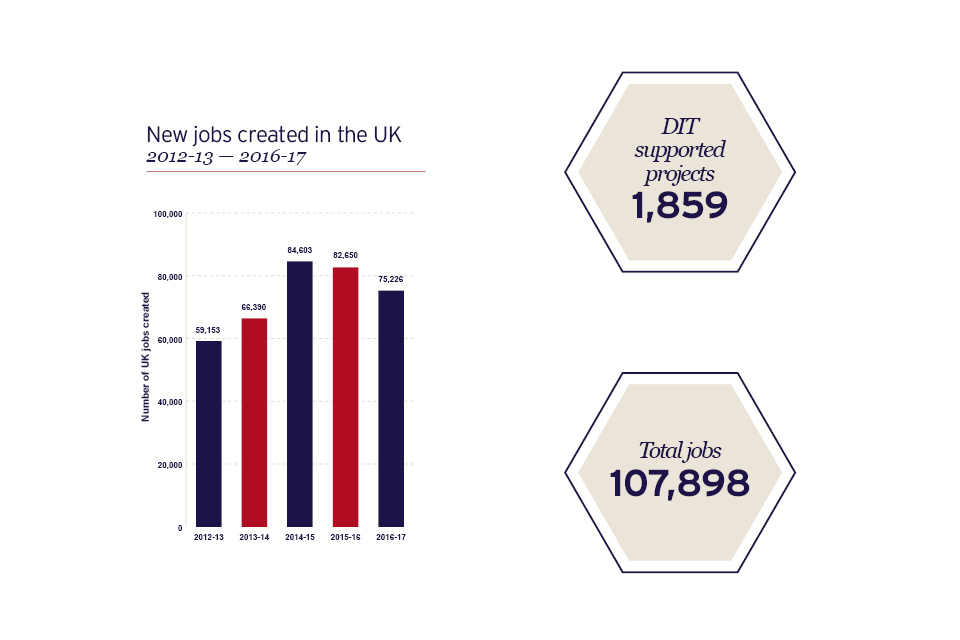Department for International Trade inward investment results 2016 to 2017 (online/web version)
Published 6 July 2017
1. Foreign direct investment (FDI) 2016 to 2017 highlights
1.1 FDI: United Kingdom
| Projects | 2015-16 | 2016-17 | % change |
|---|---|---|---|
| Involved projects | 1,731 | 1,859 | 7% |
| Total projects | 2,213 | 2,265 | 2% |
| Jobs | 2015-16 | 2016-17 | % change |
|---|---|---|---|
| New jobs | 82,650 | 75,226 | -9% |
| Safe jobs | 33,324 | 32, 672 | -2% |
| Total jobs | 115,974 | 107,898 | -7% |
1.2 FDI projects in the UK 2012-13 to 2016-17

New FDI projects 2012 -2013 to 2016 - 2017
1.3 New jobs created in the UK 2012-13 to 2016-17

New jobs created in the UK 2012 - 2013 to 2016 - 2017
1.4 Types of FDI: United Kingdom
| Types of investment projects | 2012-13 | 2013-14 | 2014-15 | 2015-16 | 2016-17 | % change |
|---|---|---|---|---|---|---|
| New investments | 777 | 820 | 1,058 | 1,130 | 1,237 | 9% |
| Expansions | 577 | 677 | 740 | 821 | 782 | -5% |
| Mergers and acquisitions (including joint ventures) | 205 | 276 | 190 | 262 | 246 | -6% |
| Total projects | 1,559 | 1,773 | 1,988 | 2,213 | 2,265 | 2% |
Source: Department for International Trade
2. New projects and jobs from FDI into the UK
| Region | Number of FDI projects | Sum of number of new jobs |
|---|---|---|
| North East | 69 | 4,609 |
| North West | 147 | 6,501 |
| Yorkshire and the Humber | 132 | 3,872 |
| East Midlands | 74 | 1,796 |
| West Midlands | 151 | 6,570 |
| East of England | 125 | 3,634 |
| London | 891 | 20,753 |
| South East | 217 | 5,432 |
| South West | 101 | 3,402 |
| Scotland | 183 | 5,547 |
| Wales | 85 | 2,581 |
| Northern Ireland | 34 | 1,622 |
56 multiple location projects associated with 8,907 new jobs are not included.
Source: Department for International Trade
3. Top source markets for FDI projects into the UK
| Source country | FDI projects | New jobs | Safeguarded jobs |
|---|---|---|---|
| Americas | |||
| Canada | 72 | 1,788 | 122 |
| United States | 557 | 24,607 | 7,197 |
| Rest of the Americas | 59 | 1,080 | 205 |
| Asia Pacific | |||
| Australia & New Zealand | 127 | 2,197 | 1,803 |
| China and Hong Kong | 160 | 3,326 | 1,444 |
| India | 127 | 3,999 | 7,645 |
| Japan | 116 | 3,511 | 6,095 |
| Rest of Asia Pacific | 82 | 1,896 | 394 |
| Europe | |||
| France | 131 | 5,831 | 2,182 |
| Germany | 100 | 5,802 | 426 |
| Ireland | 56 | 2,914 | 752 |
| Italy | 99 | 1,482 | 167 |
| Netherlands | 53 | 2,292 | 546 |
| Nordic and Baltic region | 146 | 4,417 | 976 |
| Spain | 70 | 1,789 | 1,152 |
| Switzerland | 49 | 1,428 | 643 |
| Rest of Europe, Middle East and Africa | 261 | 6,867 | 923 |
Source: Department for International Trade
4. Sector results 2016 to 2017
| Sector | FDI projects | New jobs | Safeguarded jobs | Total jobs |
|---|---|---|---|---|
| Advanced engineering and supply chain | 146 | 3,716 | 7,913 | 11,629 |
| Aerospace | 47 | 1,818 | 1,275 | 3,093 |
| Automotive | 127 | 5,711 | 8,803 | 14,514 |
| Biotechnology and pharmaceuticals | 90 | 2,329 | 896 | 3,225 |
| Business and consumer services | 211 | 13,603 | 1,353 | 14,956 |
| Chemicals and agriculture | 50 | 787 | 1,044 | 1,831 |
| Creative and media | 151 | 3,654 | 89 | 3,743 |
| Electronics and communications | 115 | 3,170 | 902 | 4,072 |
| Environment, infrastructure and transportation | 184 | 6,302 | 1,302 | 7,604 |
| Extraction industries | 49 | 642 | 758 | 1,400 |
| Financial services | 217 | 8,847 | 2,661 | 11,508 |
| Food and drink | 144 | 4,620 | 2,417 | 7,037 |
| Life sciences | 116 | 2,457 | 1,365 | 3,822 |
| Renewable energy | 87 | 2,749 | 344 | 3,093 |
| Software and computer services | 418 | 10,971 | 1,476 | 12,447 |
| Wholesale | 113 | 3,850 | 74 | 3924 |
Source: Department for International Trade
Sectors are built up from categories defined in DIT’s internal database (XLSX, 83KB).
5. How Department for International Trade can help you
Whether you are a start-up, a medium-sized or family business, a corporate or an institutional investor, Department for International Trade (DIT) supports the realisation of your international business ambitions.
DIT offers flexible support packages for every aspect of your investment. Our service doesn’t stop once you are based in the UK - it continues as your business expands internationally. We have helped thousands of businesses locate and expand in the UK. We listen to their feedback to help strengthen and improve our services.
5.1 Not sure which country is best for your business?
Comparing the benefits of locating in different countries is complicated. It is our job to explain the business environment in competitor countries. We provide the detailed factual information and market insights that let you draw meaningful conclusions about the UK’s competitiveness.
5.2 Already established here, but looking to expand your business?
We can help you develop the relationships that enable expansion in the UK and exports to European and global markets. This could include: connecting you with innovation support for new products and services; using our overseas network to increase your exports; or helping you access finance.
5.3 Already decided to bring your business to the UK?
We help you set up business quickly and efficiently, saving valuable time and money by guiding you through essential steps such as choosing the right location, finding premises, recruiting staff and connecting with the value chain. We have specialists covering all the industry sectors, as well as key issues such as visas, taxation, skills, planning permission and financial analysis.
6. Contact Department for International Trade
DIT’s services to international investors in the UK are free of charge and commercial-in-confidence.
Contact DIT’s Investment Services Team or via email at enquiries@ukti-invest.com or by telephone +44(0) 207 000 9012
Investment staff at a British embassy, high commission or trade office can also put investors in touch with the Investment Services Team.
7. Methodology and quality report
7.1 Overview and background
As the government department responsible for promoting inward investment, DIT has a responsibility to record and report accurate information about all inward investment projects successfully landing in the UK during the financial year. This 2016 to 2017 report is published for the first time as Official Statistics.
7.2 Methodology and production
Data and information related to investment projects is recorded on an internal database which is accessible by teams across the DIT network, for exmple overseas posts, UK regions and local partners.
All parties involved in a project are responsible to enter the necessary data on to the system following agreed operating principles and definitions. When this is finalised (that is when revenue generating activities have begun), the record undergoes a strict verification process where an independent team reviews the information attached to each project (eligibility, value of investment, jobs created et cetera) to check for quality, accuracy and consistency of data.
All projects must meet the same established standards and criteria to be classified as a success, and there must be sufficient evidence recorded showing that the investment decision has been made, the UK company is fully registered, and that the company has started activities on the UK site. There is a range of evidence used to support each claim ranging from public press announcements to confirmation of details from the investor.
Figures about recorded FDI projects include those investments which received support from DIT and/or one of its regional and local partners (involved projects), as well as non-involved projects, meaning those projects which have landed in the UK without any involvement from DIT or partners.
Various external sources and FDI project and company databases have been used to identify, qualify and report eligible non-involved FDI projects.
7.3 Relevance
This report has been published to ensure that there is a publicly available record showing numbers of inward investment projects into the UK for the latest financial year. It also serves to present some of the functions and processes that the department adopts to promote and record this investment.
7.4 Accuracy and definitions
FDI is a cross-border investment made by a non-UK resident entity where the direct investor acquires at least 10% of the voting power or ownership. All FDI projects reported have been subject to a strict, independent verification process and have evidence to show the investment has taken place. Job figures included in this report are estimates, made at the start of each investment project and are provided by the investor.
New jobs capture total jobs likely to be created within 3 years from the start of the project. Safeguarded jobs include those jobs which were retained as a result of the additional/new inward investment.
7.5 Timeliness and punctuality
Following the final verification of 2016 to 2017 FDI projects, information is released into the public domain as soon as full quality assurance processes have been carried out. Data is based on projects landing on a financial year basis.
7.6 Accessibility and clarity
The DIT Inward Investment Results 2016 to 2017 report presents key points including market, sector and regional breakdowns. For further detailed breakdowns and comparisons with 2015 to 2016 please see gov.uk
7.7 Coherence and comparability
DIT’s definition of FDI projects covers a wide range of investment, including those projects which are not announced by companies. This and other differences in methodology and verification processes explains the difference in the FDI project numbers published by DIT and other organisations, such as Financial Times and Ernst & Young.
Whereas these DIT statistics record the number of FDI projects and jobs created/safeguarded, ONS statistics are the official source for the value of FDI flows on stocks and earnings at the UK level. See www.ons.gov.uk for further information.
8. Department for International Trade
The UK’s Department for International Trade (DIT) has overall responsibility for promoting UK trade across the world and attracting foreign investment to our economy. We are a specialised government body with responsibility for negotiating international trade policy, supporting business, as well as delivering an outward-looking trade diplomacy strategy.
9. Disclaimer
Whereas every effort has been made to ensure that the information in this document is accurate, the Department for International Trade accept liability for any errors, omissions or misleading statements, and no warranty is given or responsibility accepted as to the standing of any individual, firm, company or other organisation mentioned.
10. Crown Copyright 2017
You may re-use this information free of charge in any format or medium, strictly in accordance with the terms of the Open Government Licence.
To view this licence, visit: www.nationalarchives.gov.uk/doc/open-government-licence or email: psi@nationalarchives.gov.uk.
Where we have identified any third party copyright information in the material that you wish to use, you will need to obtain permission from the copyright holder(s) concerned.
Published July 2017 by Department for International Trade
